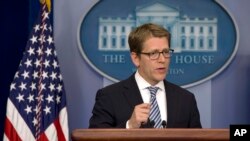WHITE HOUSE —
The White House on Monday declined to comment directly on reported Israeli air strikes in Syria. But President Barack Obama's spokesman said Israel is right to be concerned about movements of weapons to Lebanon's Hezbollah militant group.
Monday's White House news briefing was the first since air strikes over the weekend believed to have been carried out by Israel to prevent advanced weapons from being transferred to Hezbollah militants.
Though Israel took the step of clarifying it was not involving itself in Syria's civil war, the attacks brought a warning from the government of Syrian President Bashar al-Assad, which called them a declaration of war.
White House Press Secretary Jay Carney referred reporters to the Israeli government for any comment on the attacks, but said Israel is right to be concerned about sophisticated weapons going to Hezbollah.
"The transfer of sophisticated weapons to terrorist organizations like Hezbollah is certainly a concern and a threat to Israel and they have the right to act in their own sovereign interest in response to those concerns," said Carney.
Carney declined to say if the United States knew in advance that air strikes would occur, adding that the U.S. remains in close coordination generally with Israel.
Asked about the potential for a wider regional war, he reiterated concerns about the spread of violence, saying this makes achieving a political transition in Syria even more important.
The White House spokesman was also pressed again about President Obama's statements that any use of chemical weapons in Syria would cross a "red line" for him, forcing as yet unspecified action.
A New York Times report Sunday said some White House aides were concerned Obama first used the term inadvertently last year.
Calling Obama's use of the term "deliberate," Carney emphasized that Obama has an "array of options" before him if evidence proves the case that chemical weapons have been used.
"As the investigation continues and as we have said all along, he is looking at a range of options and he is not removing any option from the table, if you will, and he will take action that he thinks is in the interests of the United States and our national security, as well as in the interest of the Syrian people," he said.
President Obama has come under criticism from some Republican lawmakers, notably Arizona Senator John McCain, who accused Obama of failing to act on evidence in hand so far of chemical weapons use.
Carney "strongly disputed" McCain's remarks, and underscored the importance of having all the facts and "corroborated evidence" before policy decisions are made.
President Obama said over the weekend that he does not envision U.S. ground forces going to Syria. White House officials continue to emphasize increased non-lethal assistance to Syria's opposition.
Officials also continue to say that the U.S. believes that the Assad government, and not Syrian rebels, would likely be behind any use of chemical weapons.
Monday's White House news briefing was the first since air strikes over the weekend believed to have been carried out by Israel to prevent advanced weapons from being transferred to Hezbollah militants.
Though Israel took the step of clarifying it was not involving itself in Syria's civil war, the attacks brought a warning from the government of Syrian President Bashar al-Assad, which called them a declaration of war.
White House Press Secretary Jay Carney referred reporters to the Israeli government for any comment on the attacks, but said Israel is right to be concerned about sophisticated weapons going to Hezbollah.
"The transfer of sophisticated weapons to terrorist organizations like Hezbollah is certainly a concern and a threat to Israel and they have the right to act in their own sovereign interest in response to those concerns," said Carney.
Carney declined to say if the United States knew in advance that air strikes would occur, adding that the U.S. remains in close coordination generally with Israel.
Asked about the potential for a wider regional war, he reiterated concerns about the spread of violence, saying this makes achieving a political transition in Syria even more important.
The White House spokesman was also pressed again about President Obama's statements that any use of chemical weapons in Syria would cross a "red line" for him, forcing as yet unspecified action.
A New York Times report Sunday said some White House aides were concerned Obama first used the term inadvertently last year.
Calling Obama's use of the term "deliberate," Carney emphasized that Obama has an "array of options" before him if evidence proves the case that chemical weapons have been used.
"As the investigation continues and as we have said all along, he is looking at a range of options and he is not removing any option from the table, if you will, and he will take action that he thinks is in the interests of the United States and our national security, as well as in the interest of the Syrian people," he said.
President Obama has come under criticism from some Republican lawmakers, notably Arizona Senator John McCain, who accused Obama of failing to act on evidence in hand so far of chemical weapons use.
Carney "strongly disputed" McCain's remarks, and underscored the importance of having all the facts and "corroborated evidence" before policy decisions are made.
President Obama said over the weekend that he does not envision U.S. ground forces going to Syria. White House officials continue to emphasize increased non-lethal assistance to Syria's opposition.
Officials also continue to say that the U.S. believes that the Assad government, and not Syrian rebels, would likely be behind any use of chemical weapons.





